高级日常英语口语习惯用语
英语口语常用词汇
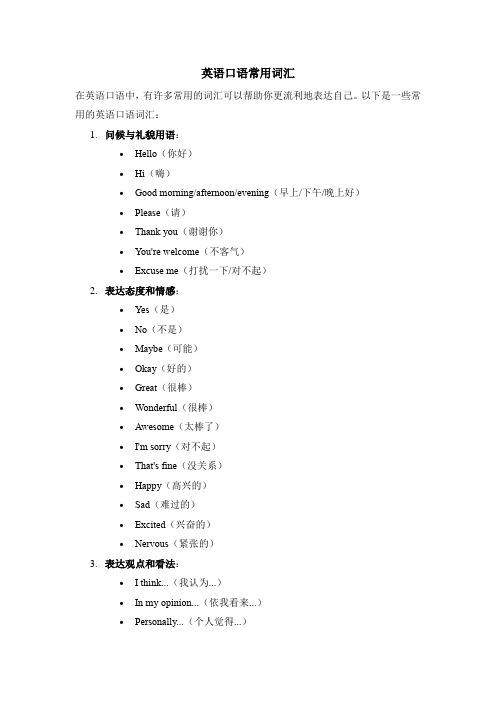
英语口语常用词汇在英语口语中,有许多常用的词汇可以帮助你更流利地表达自己。
以下是一些常用的英语口语词汇:1.问候与礼貌用语:•Hello(你好)•Hi(嗨)•Good morning/afternoon/evening(早上/下午/晚上好)•Please(请)•Thank you(谢谢你)•You're welcome(不客气)•Excuse me(打扰一下/对不起)2.表达态度和情感:•Yes(是)•No(不是)•Maybe(可能)•Okay(好的)•Great(很棒)•Wonderful(很棒)•Awesome(太棒了)•I'm sorry(对不起)•That's fine(没关系)•Happy(高兴的)•Sad(难过的)•Excited(兴奋的)•Nervous(紧张的)3.表达观点和看法:•I think...(我认为...)•In my opinion...(依我看来...)•Personally...(个人觉得...)•I believe...(我相信...)•From my perspective...(从我的角度来看...)•As far as I'm concerned...(就我而言...)•It seems to me that...(我觉得...)4.表达时间和频率:•Now(现在)•Later(稍后)•Soon(很快)•Sometimes(有时候)•Often(经常)•Always(总是)•Never(从不)5.请求和建议:•Can you...?(你能...吗?)•Could you...?(你可以...吗?)•Would you mind...?(你介意...吗?)•Let's...(让我们...)•Why don't we...?(我们为什么不...?)6.表达意见和想法:•I agree(我同意)•I disagree(我不同意)•I suppose(我猜)•I guess(我猜)•I'm not sure(我不确定)•I understand(我明白)以上这些词汇可以帮助你更加流利地进行日常英语口语交流。
学习常见的习惯用语的英文表达
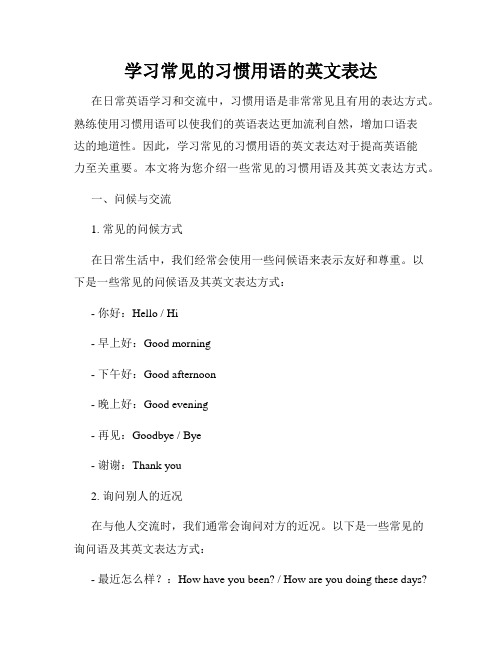
学习常见的习惯用语的英文表达在日常英语学习和交流中,习惯用语是非常常见且有用的表达方式。
熟练使用习惯用语可以使我们的英语表达更加流利自然,增加口语表达的地道性。
因此,学习常见的习惯用语的英文表达对于提高英语能力至关重要。
本文将为您介绍一些常见的习惯用语及其英文表达方式。
一、问候与交流1. 常见的问候方式在日常生活中,我们经常会使用一些问候语来表示友好和尊重。
以下是一些常见的问候语及其英文表达方式:- 你好:Hello / Hi- 早上好:Good morning- 下午好:Good afternoon- 晚上好:Good evening- 再见:Goodbye / Bye- 谢谢:Thank you2. 询问别人的近况在与他人交流时,我们通常会询问对方的近况。
以下是一些常见的询问语及其英文表达方式:- 最近怎么样?:How have you been? / How are you doing these days?- 你好吗?:How are you?- 有什么新鲜事吗?:What's new?二、描述与评论1. 描述人或事物在英语表达中,我们经常需要使用一些习惯用语来描述人或事物。
以下是一些常见的描述习语及其英文表达方式:- 外貌:as pretty as a picture(漂亮如画)- 性格:a piece of cake(温和、容易相处的)- 聪明:as sharp as a tack(聪明如锋利的图钉)- 快乐:as happy as a clam(非常快乐)2. 表示同意或不同意在交流中,表达自己的观点时,我们通常会使用一些习惯用语来表示同意或不同意。
以下是一些常见的表示同意或不同意的习语及其英文表达方式:- 同意:I couldn't agree more(我非常同意)- 不同意:I'm afraid I disagree(恐怕我不同意)三、日常生活1. 饮食方面习语在描述食物或饮食方面的习语中,我们可以使用一些常见的习语表达方式,如:- 一切顺利:smooth sailing(形容事情进行得很顺利)- 吃早饭:have breakfast(吃早饭的意思)- 慢慢吃:take your time(慢慢吃饭)2. 购物方面习语在购物过程中,我们通常也会使用一些习语来表达意愿或与商家进行交流。
英语口语常用习惯用语

英语口语常用习惯用语一:与时间相关的习语1. Put the clock back[字面意思]:把钟表指针向后拨。
[实际意思] 指行为或观念跟不上时代;按陈旧的规矩办事;老脑筋。
E.g.: You must give university students more freedom. Don’t try to prevent them from falling in love before graduation. You can’t put the clock back!原来这样简单的词句,也能表达如此确切的意思!2. Work against the clock[字面意思]:与钟表的走动比赛。
[实际意思] 指的是抓紧时间工作,强调不停顿哦~E.g.: I have to work against the clock to finish my thesis before the holiday finishes. Otherwise my supervisor will not be happy with me.我们辛勤的烤鸭们还可以这样说哦:I have to work against the clock to pass the IELTS exam. 哈哈,是不是很准确的表达了烤鸭考前的心情!3. Go like clockwork[字面意思]:像钟表的机械装置一样运转。
[实际意思] 指计划、安排、工程或项目等进展顺利,强调有条不紊,没有麻烦。
它还有另一种说法:Run like clockwork.E.g.: The president is very happy that all our arrangements for the project are going like clockwork. And I am sure we can finish the project in time.如果part2的话题考到了future plan, something you saved money for这种和计划相关的话题,烤鸭们是可以把go like clockwork运用上去的,表达我们的计划按部就班,进展的非常顺利~4. After hours[字面意思]:钟点之后。
日常沟通英语词汇大全
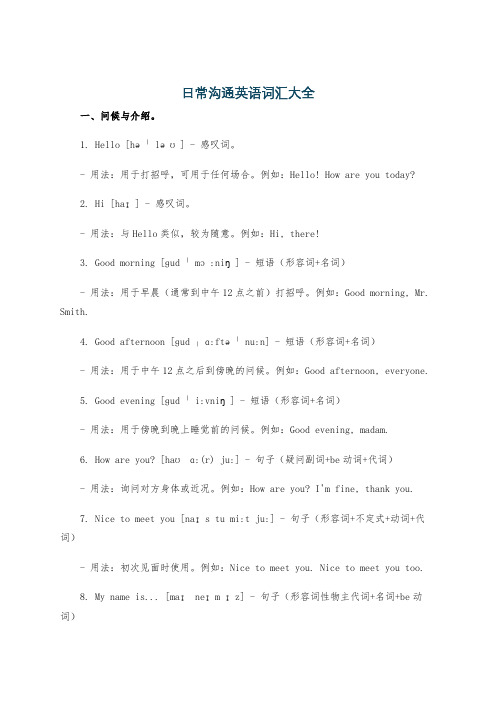
日常沟通英语词汇大全一、问候与介绍。
1. Hello [həˈləʊ] - 感叹词。
- 用法:用于打招呼,可用于任何场合。
例如:Hello! How are you today?2. Hi [haɪ] - 感叹词。
- 用法:与Hello类似,较为随意。
例如:Hi, there!3. Good morning [ɡud ˈmɔ:niŋ] - 短语(形容词+名词)- 用法:用于早晨(通常到中午12点之前)打招呼。
例如:Good morning, Mr. Smith.4. Good afternoon [ɡud ˌɑ:ftəˈnu:n] - 短语(形容词+名词)- 用法:用于中午12点之后到傍晚的问候。
例如:Good afternoon, everyone.5. Good evening [ɡud ˈi:vniŋ] - 短语(形容词+名词)- 用法:用于傍晚到晚上睡觉前的问候。
例如:Good evening, madam.6. How are you? [haʊɑ:(r) ju:] - 句子(疑问副词+be动词+代词)- 用法:询问对方身体或近况。
例如:How are you? I'm fine, thank you.7. Nice to meet you [naɪs tu mi:t ju:] - 句子(形容词+不定式+动词+代词)- 用法:初次见面时使用。
例如:Nice to meet you. Nice to meet you too.8. My name is... [maɪ neɪm ɪz] - 句子(形容词性物主代词+名词+be动词)- 用法:用于介绍自己的名字。
例如:My name is Tom.二、家庭与人物关系。
1. Father [ˈfɑ:ðə(r)] - 名词。
- 用法:指父亲。
例如:My father is a doctor.2. Mother [ˈmʌðə(r)] - 名词。
英语口语最常用1000句
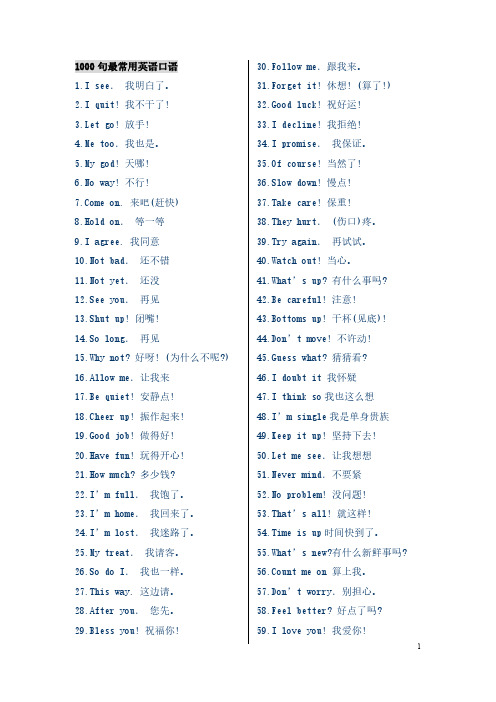
1000句最常用英语口语1.I see.我明白了。
2.I quit! 我不干了!3.Let go! 放手!4.Me too.我也是。
5.My god! 天哪!6.No way! 不行!e on. 来吧(赶快)8.Hold on.等一等9.I agree. 我同意10.Not bad.还不错11.Not yet.还没12.See you.再见13.Shut up! 闭嘴!14.So long.再见15.Why not? 好呀! (为什么不呢?)16.Allow me.让我来17.Be quiet! 安静点!18.Cheer up! 振作起来!19.Good job! 做得好!20.Have fun! 玩得开心!21.How much? 多少钱?22.I’m full.我饱了。
23.I’m home.我回来了。
24.I’m lost.我迷路了。
25.My treat.我请客。
26.So do I.我也一样。
27.This way. 这边请。
28.After you.您先。
29.Bless you! 祝福你! 30.Follow me.跟我来。
31.Forget it! 休想! (算了!)32.Good luck! 祝好运!33.I decline! 我拒绝!34.I promise.我保证。
35.Of course! 当然了!36.Slow down! 慢点!37.Take care! 保重!38.They hurt. (伤口)疼。
39.Try again.再试试。
40.Watch out! 当心。
41.What’s up? 有什么事吗?42.Be careful! 注意!43.Bottoms up! 干杯(见底)!44.Don’t move! 不许动!45.Guess what? 猜猜看?46.I doubt it 我怀疑47.I think so我也这么想48.I’m single我是单身贵族49.Keep it up! 坚持下去!50.Let me see.让我想想51.Never mind.不要紧52.No problem! 没问题!53.That’s all! 就这样!54.Time is up时间快到了。
英语口语集锦-一些习惯用语

1.他已绞尽了脑汁。
He had racked his brain.rack--使受折磨,使痛苦。
也可说wrack your brain(s)2.这几天不知是什么事把我搞得心烦意乱的。
I don‘t know what has set my nerves on edge these days.nerves---神经元3.我可不愿意白吃白喝别人。
I wouldn‘t freeload.freeloader---a person who is always accepting free food and accommodation from other people without giving them anything in exchange寄生虫4.他们开车到外面兜风去了。
They drove the car and went out for a spin.spin--高速驾驶5.你为什么总拿别人开心?Why should you always like to rib others?rib--to laugh at sb and make jokes about them, but in a friendly way6.新任宣传部经理的确精明干练。
The new publicity manager is really on the ball.on the ball----to be aware of and understand what is happening and able to react quickly 敏锐,机警7.他对保险业务一窍不通。
He doesn‘t know beans about insurance business at all.full of beans ---having a lot of energy精力充沛not have a bean---to have no money 不名一文8.别跟我瞎吹了,我又不是不了解你底细。
外国人十句最地道的英语口语
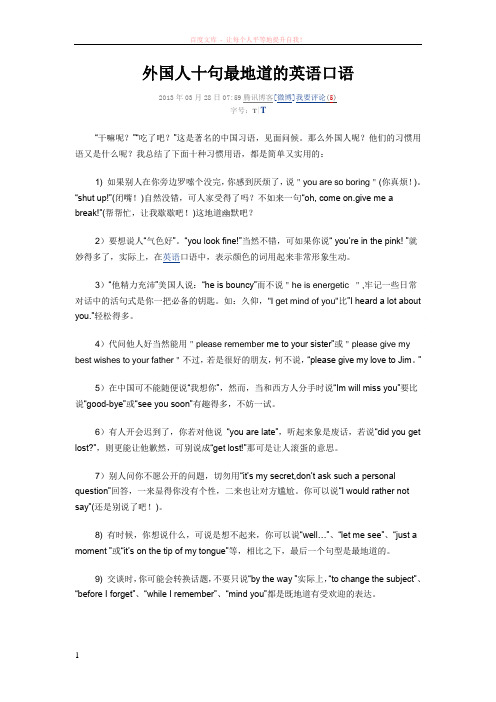
外国人十句最地道的英语口语2013年03月28日07:59腾讯博客[微博]我要评论(5)字号:T|T“干嘛呢?”“吃了吧?”这是著名的中国习语,见面问候。
那么外国人呢?他们的习惯用语又是什么呢?我总结了下面十种习惯用语,都是简单又实用的:1) 如果别人在你旁边罗嗦个没完,你感到厌烦了,说"you are so boring"(你真烦!)。
“shut up!”(闭嘴!)自然没错,可人家受得了吗?不如来一句“oh, come on.give me abreak!”(帮帮忙,让我歇歇吧!)这地道幽默吧?2)要想说人“气色好”。
“you look fine!”当然不错,可如果你说“ you’re in the pink! ”就妙得多了,实际上,在英语口语中,表示颜色的词用起来非常形象生动。
3)“他精力充沛”美国人说:“he is bouncy”而不说"he is energetic ",牢记一些日常对话中的活句式是你一把必备的钥匙。
如:久仰,"I get mind of you"比”I heard a lot about you.”轻松得多。
4)代问他人好当然能用"please remember me to your sister”或"please give my best wishes to your father"不过,若是很好的朋友,何不说,“please give my love to Jim。
”5)在中国可不能随便说“我想你”,然而,当和西方人分手时说“Im will miss you”要比说“good-bye”或“see you soon”有趣得多,不妨一试。
6)有人开会迟到了,你若对他说“you are late”,听起来象是废话,若说“did you get lost?”,则更能让他歉然,可别说成“get lost!”那可是让人滚蛋的意思。
7)别人问你不愿公开的问题,切勿用“it’s my secret,don’t ask such a personal question”回答,一来显得你没有个性,二来也让对方尴尬。
口语习惯用语100句

1,a change of pace 节奏变换Y ou can’t do these chemistry experiments all day long. Y ou certainly need a change of pace.2, a far cry from 相距甚远The published book is far cry from the early manuscript.3, and how 的确A: She’s a good dancer.B: and how.4, a matter of time 时间问题It is only a matter of time.5, a phone call away 一个电话之远If you need my help, do let me know. Just remember I am a phone call away.6, a while back 不久以前7,all along 一直I knew it all along.8, anything but 绝对不I was anything but happy about going.9, account for 解释How do you account for it?10, after all 到底A: I’ve just seen the X-rays and your teeth look just fine,B: I see. Then there is nothing to worry about after all.11, allergic to 对|……过敏Oh man! Something in this room is making my eyes itch. I must be allergic to something.12, at sb’s service 愿为某人服务I am at your service at any time.13, around the clock 24小时不停Martha studied around the clock for management exam.14, as far as I know 就我所知15,at home with 对…..很熟悉She is at home with problems like this.16, back out1) 退出A: Wasn’t Bert supposed to sing tonight?B: Yes, but he backed out at last minute2)不履行She finally backed out of her promise.17, be cut out for 天生适合I’m not cut out to be a hero.18, be absorbed inShe has been absorbed in a horror fiction. I can’t tear her away.19, be addicted to 对……上瘾She has been addicted to drugs for years.20,be attached to 对……有感情A: I’m amazed that you are still driving that old car of yours. I thought you would have gotten rid of it years ago.B: It runs well and I’ve actually been quite attached to it.习惯用语一to rub elbows(出去和别人接触和交际)to call it a day(今天就到此为止了)to call the shots(做最后决定)munch(吃零食)grubstake(创业资金)egghead(知识分子、书呆子)to give up the ghost(死了、完蛋了)to scratch one's back(这回你帮我,下回我帮你) brainchild(点子、主意、发明)to turn one's back on(不理某人、不帮某人)to drag one's feet(拖拖拉拉)smart(聪明&衣著时髦、漂亮)basket case(毫无希望)on a cloud(兴奋得飘飘然)in the clouds(心不在焉)cry baby(哭哭啼啼的)crocodile tears(猫哭耗子假慈悲)to throw for a loop(大吃一惊)Every dog has his day.(每个人总会有机会的)to put on the dog(摆阔)sidekick (好友)rainy day(准备一些钱,以备不时之需)to let the cat out of the bag(不小心泄露秘密)to throw a wet blanket on something(泼冷水)to throw to the wolves(牺牲别人来解救自己)to give someone a piece of one's mind(把某人臭骂了一顿)maverick(有独立主见的议员)lame duck(竞选连任失败,即将卸任的官员)sleaze (人身攻击)swing voter(中间选民、中间票)Don't change horses in the middle of the stream ( 别中途换人 ) blame game (抹黑、推卸责任)favorite son (某一州举行初选时本州的候选人)to throw one's hat in the ring (决定参赛、参加竞选)wimp (软骨头 )nerd (书呆子)to eat one's heart out (非常伤心)to keep something under your hat ( 保守秘密 )at the drop of a hat ( 马上行动 )to kick off ( 开始 )to kick the bucket ( 死了 )kickback (贿赂)to clam up ( 闭嘴、口风很紧 )eye-opener ( 惊讶、开了眼界 )to keep one's eyes peeled ( 提高警觉 )eyes pop out ( 惊奇 )to feast your eyes on ( 饱享眼福 )cold fish (对人冷淡)to teach a fish how to swim ( 班门弄斧 )grapevine ( 小道消息 )going bananas ( 快要发疯了 )peaches and cream ( 完美无缺 )I got fired. ( 我被炒鱿鱼了的10种说法 )zip it ! ( 闭嘴 )rub shoulder with ( 与... 往来密切 )odds and ends ( 零星小东西 )bomb ( 不成功、不受欢迎、卖座率很低 )let one's hair down ( 放轻松 )blockbuster ( 最成功的电影 )cross my heart ( 我发誓 )pull your socks up ( 振作起精神来 )Give someone the cold shoulde (故意冷落人) a nine days' wonder ( 昙花一现 )a bread-and-butter letter (感谢款待的信) the Jolly Roger ( 海盗船的姑骷髅旗 )poker face ( 面无表情的扑克脸 )The shoe is on the other foot. (情况完全不同了) go the whole hog ( 一不做二不休 )corss one's finger ( 祈求幸运的手势 )pay through the nose ( 付更高的代价 )crocodile tears (假装难过)sweeten the pot ( 加点甜头 )fly off the handle (发火)big cheese; big nose ( 重要人物 )Uncle Sam ( 老美代名词 )big brother ( 独裁老大哥 )lazy Susan ( 餐桌中央的旋转餐台 )the real McCoy(如假包换的真货)water off a duck's back ( 毫不起作用 )throw cold water on something ( 泼冷水 )doggy bag(剩菜带回家)Geek ( 书呆子 )steal one's thunder ( 被偷走了的雷声 )Yankee ( 老美 )white elephant ( 白象:大而无用的东西 )Greasy Spoon ( 小饭馆 )Give me a hand(帮一下忙)Singing the blues(诉苦、抱怨)♀ ♂ (记号)top gun 〈最优秀的〉laugh up one's sleeve ( 偷偷地笑 ) a horse laugh ( 嘲笑 )forty winks ( 打瞌睡 )as pleased as punch ( 非常快乐 )dead as a dodo ( 失效、不复存在 ) shoot the breeze(闲聊)forget-me-not ( 勿忘我 )turnpike ( 收费高速公路 )mind one's p's and q's ( 注意礼貌 ) the buck stop here ( 责无旁贷 )blue movie ( 黄色电影 )hot and bothered ( 既生气又担心 ) take French leave(不辞而别)a bed of roses ( 美丽人生 )marathon ( 马拉松 )athlete's foot ( 香港脚 )a baker's dozen ( 13 )honeymoon ( 蜜月 )blue-chip ( 绩优股 )peace dove ( 和平鸽 )boomerang ( 回力棒 )blacklist ( 黑名单 )a lame duck ( 处于困境者 )peeping Tom ( 偷亏狂 )the pros and cons ( 正反两方 )习惯用语二1. a babe in arms 涉世未深的人You can't depend on him. He's just a babe in arms.你不能依靠他,他只是个涉世未深的毛孩子。
- 1、下载文档前请自行甄别文档内容的完整性,平台不提供额外的编辑、内容补充、找答案等附加服务。
- 2、"仅部分预览"的文档,不可在线预览部分如存在完整性等问题,可反馈申请退款(可完整预览的文档不适用该条件!)。
- 3、如文档侵犯您的权益,请联系客服反馈,我们会尽快为您处理(人工客服工作时间:9:00-18:30)。
高级日常英语口语习惯用语
1. Hold on 等一下 (口语中,人们不太用wait a minute)如果两人辩论,吵架,抬杠,你要别人“打住”,能够说,hold it right there.
2. I hate his guts. 我最讨厌他。
也有说I hate him guts. Guts 是肠子,相当于“恨之入骨”的意思。
He doesn‘t have many guts. 他是个胆小鬼。
ut feeling 直觉
3. Nuts,果仁,核,为复数时,意为“疯子”,He is nuts.他
有神经病。
He went nuts and killed a guy.他发疯了,结果杀了一
个人。
You are driving me nuts. 你真是要把我逼疯。
a tough nut
to crack,一项艰巨的任务,一个难解之题
4. How is everything? (还好吗?) I am just stuck in a rut,doing the same things every day. I wish I could do something different. (烦死了,每天都是干同样的活,我真想换个活法。
) rut 日常的,每天都如此,get in a rut,日复一日,天天如此
5. I have totally sold out to your idea. 我100%地赞同赞同你的意见。
类似的话还有If you are not careful enough, you
will buy into his bad idea. 如果你不小心的话,你就会采纳他的
这馊主意。
6. I am just ecstatic about going to visit you soon. 马上
要见你,我高兴死了。
7. A dap and dip 打个照面,露下脸就走。
Matt:Are we going to Jon‘s party?我们去琼的聚会吗?
Darryl: Yeah,but I don‘t want to stay long, so
let’s make it a dap and dip.那就去吧,不过我可不想多呆,顶多
就打个照面就走人。
8. I would like to get a job within couching distance. 我
想找个不用走路就能够上班的工作。
Couching distance,沙发距离,
就是坐在沙发上不起身也能够得着。
这是那种 couch potato喜欢做的美梦。
9. Yukky 难吃,说这个词时还要做一个难吃的表情。
Where did you get this food? It was yukky. 你从哪里弄了这吃的?那么难吃。
10. 与yukky相反的词是yummy,好吃极了。
说这个词时,要不然就把音拖一下,要不然说它两次,表示你真的喜欢主人做的这道菜。
11 I cannot take it any more. 我再也无法忍受了。
前面还能
够加上一句:don‘t push me. 不要再逼我呀。
同样意思的句子还有:I cannot stand him any longer. 12 Don’t take it out on me!
不要把气出在我身上。
13 You have my word. 我向你保证(是这样)。
14 Look, I have to got going. 就这样了,我还得干活呢(还
得赶路)。
这是向人告辞的说法。
15 You're talking crazy. 你满嘴胡言。
相当于you talk nonsense之意。
从语法上看,将形容词放在动词后不是很正规,但人家都这么说,也就能够将就了。
